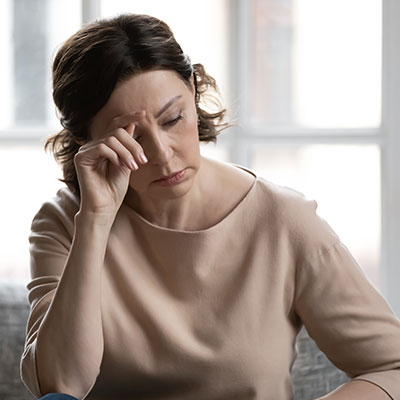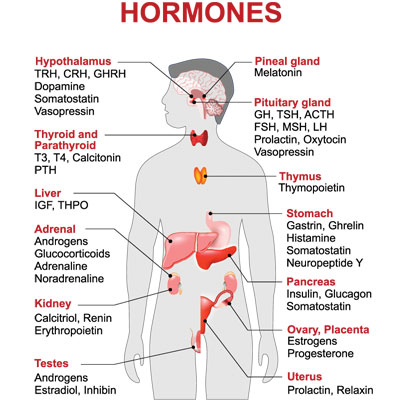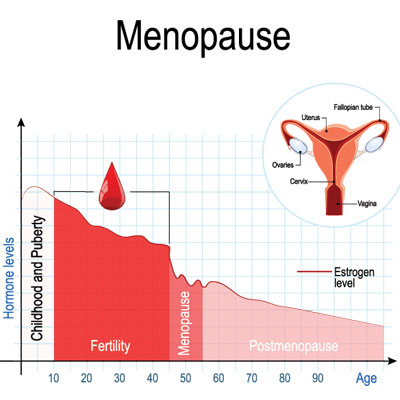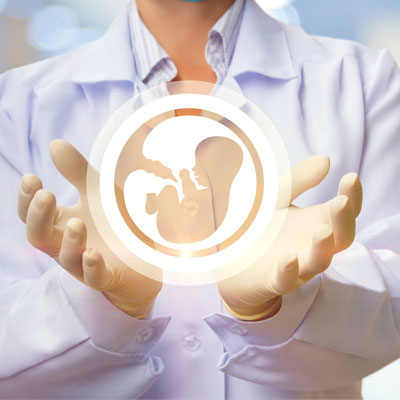Contents
- About Hormone Imbalances
- Symptoms of Hormone Imbalance
- Causes of Hormone Imbalance in Women
- Medical Conditions That Can Cause Hormone Imbalances
- How Do Doctors Treat Hormone Imbalances?
- What Are the Benefits of Hormone Replacement for Hormone Imbalance?
- Are There Any Alternative or Natural Ways to Treat Hormone Imbalances?
- What Does the Medical Research Say About Treating Hormone Imbalance in Women?

Hormones are chemical messengers that are critical to many bodily functions and overall health. In a woman’s body, hormones control everything from sexual function and fertility to mood and metabolism.
Of the hormones that impact women’s health, estrogen and progesterone are probably the ones you are most familiar with. But women’s bodies make and need testosterone as well. In addition, adrenal hormones and thyroid hormones all are critical to a woman’s health and wellness. Any and all of these hormones can become imbalanced.
Hormones are chemicals produced by glands in the endocrine system and released into the bloodstream. A hormone imbalance occurs when there is too much or too little of a hormone. While there are certain medical conditions that occur from too much of a given hormone, too little hormones is the far more common problem. This is particularly true as women age; for the most part, we will be discussing hormone imbalance in women that occurs due to age-related hormone decline.
About Hormone Imbalances
Every woman knows what it is like to be “hormonal.” While that is sometimes used as an unflattering term, the fact of the matter is hormonal imbalances in women can be to blame for a wide range of unwanted symptoms from weight gain, low energy, and sexual health issues to itchy skin or mood swings.
Symptoms of Hormone Imbalance
Since a woman’s hormones are involved in the regulation of so many different bodily functions, the symptoms of hormone balance can be quite varied and often involve the imbalance of more than one hormone.
Hormonal imbalance symptoms in women include:
- Night sweats
- Reduced interest in sexual activity
- Infertility
- Mood swings
- Trouble sleeping
- Depression
- Changes in appetite
- Deepened voice
- Altered heart rate
- Soreness in breasts
- Swollen face
- Headaches
- Difficulty concentrating
- Bloating (body)
- Weight gain
- Weight loss
- More or less frequent urination or bowel movements
- Dry skin
- Skin rashes
- Bulge in the neck
- Weak bones
- Thin hair
- Hair loss
- Sweating
- Changes in blood sugar
- Changes in sensitivity to heat or cold
- Thirst
- Vision problems
- Enlarged clitoris
- Infertility
- Long-lasting fatigue
Causes of Hormone Imbalance in Women
There are certain times in a woman’s life when hormone imbalance is to be expected. For example, it is normal for a woman’s hormone levels to fluctuate due to menstruation, puberty, pregnancy, and menopause. However, certain medical conditions, lifestyle habits, environmental conditions, and endocrine gland deficiencies can also be causes of hormonal imbalance in females.
There are many hormones that are critical to a woman’s health and well-being, and they are regulated by so many different glands that the causes of hormone imbalance can be enumerable.
Causes of hormonal imbalance in women include:
- Unhealthy diet
- Excessive stress
- High percentage of body fat
- Pituitary tumors
- Type 1 and Type 2 diabetes
- Prader-Willi syndrome (a genetic condition marked by chronic hunger)
- Hereditary pancreatitis (inflammation of the pancreas)
- Injury to the endocrine gland
- Extreme infections
- Toxins, pollutants, herbicides, and pesticides
- Severe allergic reactions
- Abuse of anabolic steroid medications
- Having only one functioning X chromosome (known as Turner syndrome and can cause heart and ovary defects)
- Overactive or underactive thyroid
- Phytoestrogens, natural plant estrogens in soy products (estrogen dominance is linked to breast cancer, ovarian cancer, infertility, and autoimmune disorders)
- High levels of glucagon (can lead to diabetes-like symptoms) • High levels of insulin
- Too much or too little parathyroid hormone (helps balance the levels of calcium in the bloodstream)
- Birth control medications
- Hormonal replacement medications
- Benign tumors or cysts that impact the endocrine glands
- Cancers that impact the endocrine glands
- Chemotherapy or radiation
- Solitary thyroid nodules (usually a non-lethal growth, although they can be a possible sign of throat cancer)
- High levels of cortisol hormone
- Too little cortisol and aldosterone (also known as Addison’s Disease, a condition sharing many of the symptoms of hormonal imbalance in women, including extreme fatigue, irritability, and sexual dysfunction)
- Deficient levels of iodine
- Anorexia
- Medications
Medical Conditions That Can Cause Hormone Imbalances
Medical conditions that can cause hormone imbalances in women include ovarian cancer, polycystic ovary syndrome (PCOS), early menopause, and/or primary ovarian insufficiency (POI).
While these various medical conditions and other glandular malfunctions can all cause hormone imbalance in women, the most common reason that women will be experiencing hormonal issues is the age-related hormone decline that occurs as women approach and enter menopause.
How Do Doctors Treat Hormone Imbalances?

The synthetic hormones that are made by the big pharmaceutical companies are not the same as the hormones produced by your body. In fact, they are specifically designed to be unique so that drug companies can patent them for bigger profits.
Since bioidentical hormones are exact replicas of your own hormones, they are better recognized and better absorbed by your body. Bioidentical hormones are the safest and most effective type of hormone replacement therapy available.
Bioidentical hormones are given in several ways. In addition to injections, creams, patches, pills, gels, and pellets are among the ways BHRT can be prescribed. Your doctor will determine which delivery method is best for you based on your particular needs and lifestyle.
As compared to their synthetic counterparts, bioidentical hormones have been found:
- To be more effective
- To be safer and better tolerated
- To produce greater health benefits and positive effects
- To reduce the risk of cancer or heart disease
As opposed to the hormones created from plant sources, synthetic hormones are made from animal sources that your body sees as “hostile invaders.” Your body does not recognize them and may treat them as toxins, which at best lowers their effectiveness, and at worst, may trigger severe side-effects such as heart attacks, stroke, or cancer.
For the most part, custom bioidentical hormone combinations include blends of the same ingredients found in FDA-approved bioidentical hormones. However, since they are custom-made for your particular symptoms and goals, they are usually the preferred option to standard synthetic hormones.
What Are the Benefits of Hormone Replacement for Hormone Imbalance?
In addition to the relief of sexual health issues and the other symptoms of hormone imbalances, bioidentical hormone replacement for women also has been shown to:
- Strengthen bones and increase bone density
- Reduce the foggy thinking typical of menopause and otherwise improve cognition
- Increase energy and vitality
- Support the increase of lean muscle and reduce belly fat
- Decrease wrinkles, improve the texture and elasticity of the skin
- Provide improved energy and daily stamina
- Improve the health and vitality of hair and nails
- Reduce the occurrence of mood swings, depression, and anxiety
Recently published studies have concluded that properly administered and supervised bioidentical hormone therapy significantly improves the quality of life of menopausal, postmenopausal, or any woman suffering from hormone imbalance due to low hormone levels.
Are There Any Alternative or Natural Ways to Treat Hormone Imbalances?
Hormone replacement therapies are generally regarded as the best ways to treat hormone imbalances in women. However, there are some natural or alternative methods that have been shown to be somewhat effective in helping to maintain proper hormone balance in women.
Some herbs and natural supplements that have been suggested to help treat hormone imbalance in women include:
- Nigella seeds
- Ashwagandha
- Black cohosh root
- Chasteberry
- Marjoram
In addition, try these lifestyle changes to help keep hormones in balance:
- Eat Enough Protein at Every Meal. Consuming an adequate amount of protein is extremely important.
- Engage in Regular Exercise.
- Avoid Sugar and Refined Carbs
- Learn to Manage Stress
- Consume Healthy Fats
- Avoid Overeating and Undereating
- Drink Green Tea
- Eat Fatty Fish Often
What Does the Medical Research Say About Treating Hormone Imbalance in Women?

The latest research on using hormone replacement for treating women with hormone deficiencies also has found that HRT is much safer than it was once thought to be. This specifically relates to the risks of heart disease and breast cancer.
In the early years of HRT, doctors prescribed it almost as a matter of course for any woman entering menopause. However, a decade or so ago, HRT for women became a bit controversial. This was because many women, and even some doctors, came to believe that it caused an increased risk of breast cancer and heart disease.
This fear was largely created by a study known as the Women’s Health Initiative (WHI). The WHI looked at women who were prescribed HRT for menopause. WHI concluded that there seemed to be a link between HRT and an increased risk of developing breast cancer and/or heart disease.
However, upon more recent analysis, the WHI study has been found to be flawed, and many of its conclusions were wrong. In the many years since it was published, doctors have learned much more about HRT and how to safely prescribe it for maximum effectiveness, with minimal risks.
A very recent study Trusted sourceResearch shows some types of HRT are linked to lower risks of breast cancerNational Institute for Health ReaserchGo to sourcepublished in 2021 found that – in line with other evidence – the risks of HRT are generally low and that breast cancer risks were extremely low with bioidentical HRT.
Hormone imbalances in women can lead to weakened bones and an increased risk of osteoporosis. A Trusted sourceHormone replacement therapy and the prevention of postmenopausal osteoporosisNCBIGo to source2014 study published in Menopause Review, looking at ways to minimize osteoporosis-related fractures in postmenopausal women, concluded, “Hormone replacement therapy (HRT) at different doses rapidly normalizes turnover, preserves bone mineral density (BMD) at all skeletal sites, leading to a significant, reduction in vertebral and non-vertebral fractures.”
A 2007 study looking into the effectiveness of danazol, a hormonal treatment used to treat hormone imbalances in women with recurrent deeply infiltrating endometriosis, concluded that “Vaginal danazol resulted ineffective medical treatment for the various painful symptoms in women with recurrent deeply infiltrating endometriosis, and because of the lack of significant adverse effects, it may be proposed as an alternative to repeated surgery.”
Now that you know a lot more about how to treat hormone imbalance in women, why not contact us and learn more about the many life-changing benefits of bioidentical hormone replacement therapy?
FAQ
What Is a Hormone Imbalance?
A hormone imbalance is defined as having too little or too much of a given hormone in the bloodstream.
How Are Hormone Imbalances Treated?
Treatment for hormonal imbalances is determined by the specific cause and highly tailored to each individual woman. Each female may require a different regimen of treatment. Medical treatments and lifestyle changes show the best long-term results. The most common treatment for hormone imbalances due to hormone deficiencies is hormone replacement therapy.
Do Hormone Imbalances Only Effect Menopausal Women?
Even women who have not yet entered menopause can suffer from hormone imbalances. In particular, women over 35 who have not yet entered menopause can suffer from low testosterone. Low testosterone in women can affect mood sexual wellness, and a recent study indicates that it can also increase a woman's risk of cardiovascular disease.
What Are Bioidentical Hormones?
Bioidentical hormones are natural compounds derived from plants. Unlike commonly prescribed synthetic hormones, bioidentical hormones have the same molecular structure as hormones produced by the body, allowing them to be metabolized much more easily. That chemical compatibility with the body yields more effective symptom relief than synthetic hormones with fewer risks and side effects.
What Are the Five Most Common Hormone Imbalances in Women?
Women have several critical hormones that regulate various important bodily processes. The five most common hormones in women that can become imbalanced are:
- Cortisol
- Estrogen
- Insulin
- Progesterone
- Testosterone
In addition to these five, women may also suffer imbalances of thyroid hormone and adrenal hormones.






